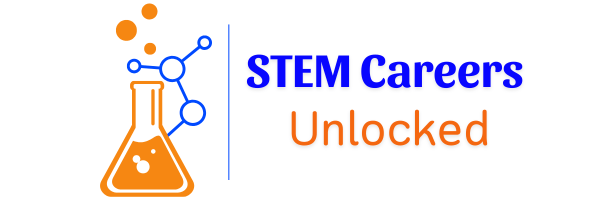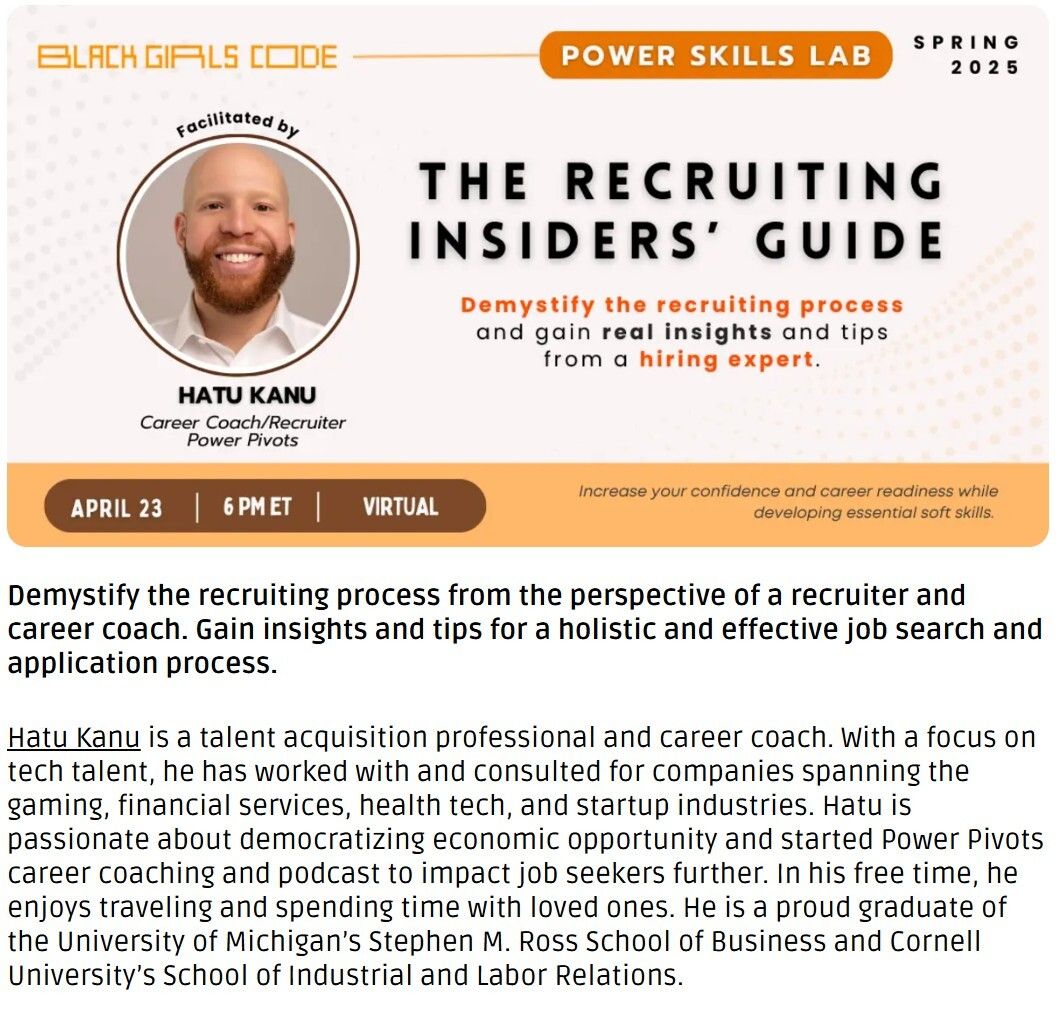
Good morning, STEM enthusiasts! It’s Good Friday—a perfect time to pause, reflect, and shift our mindset toward growth and purpose. Let’s make today amazing by embracing fresh perspectives and bold moves in STEM and beyond. 🚀⚛️
Today’s issue:
🔎Career Spotlight: Keeping the Medicine Moving: Inside the Role of a Supply Chain Analyst
🎙️Ask A Scientist: From Biology Major to Public Health Advocate: Kaylei Smith-Taylor
💡Skills Spotlight: From Technical Expert to People Leader - Making the Mindset Shift
🔥Career Glow-Up Challenge: Glow-Up Your Network and Build Genuine Connections

🔎STEM CAREER JOB OF THE WEEK
Keeping the Medicine Moving: Inside the Role of a Supply Chain Analyst"

A Pharmaceutical Supply Chain Analyst helps ensure that every part of the drug production and distribution process runs smoothly, from sourcing raw materials to delivering medications to healthcare providers or pharmacies. They analyze data to optimize inventory, forecast demand, manage supplier performance, and reduce costs—all while meeting strict regulatory and quality standards.
Major:
- Supply Chain Management, Industrial Engineering, Operations Management, Pharmaceutical Sciences, Data Analytics or Statistics (with a focus on sales or marketing), Biotechnology, or other related science degrees.
Job functions:
Supply Chain Analysts are problem-solvers who analyze and optimize the entire process of getting products from point A to point B. Some key responsibilities include:
🔎Data Analysis & Forecast: Analyze sales trends, production data, and market demand to forecast drug needs. Use predictive modeling to prevent shortages or overstocking.
🔎Inventory & Logistics Optimization: Track inventory levels and product movement across the supply chain. Identify bottlenecks or inefficiencies and recommend solutions.
🔎Vendor & Supplier Coordination: Evaluate supplier performance and manage relationships. Ensure raw materials and components arrive on time and meet quality standards.
🔎Compliance & Risk Management: Ensure the supply chain adheres to regulations like FDA, cGMP, or DEA requirements. Identify and mitigate risks associated with delays, quality issues, or product recalls.
Skills Needed:
- Technical: Supply chain systems (SAP, Oracle), Data analysis, Forecasting & modeling techniques
- Soft Skills: Attention to detail, critical thinking & problem solving, communication * teamwork, and time management.
Salary Landscape:
- The salary range varies depending on factors such as location, experience, and skill level.
- An entry-level Supply Chain Analyst can expect an annual salary ranging from $39,868 to $134,150, with an average of $80,152 per year in the United States. Source: Zip Recruiter)

Looking for unbiased, fact-based news? Join 1440 today.
Join over 4 million Americans who start their day with 1440 – your daily digest for unbiased, fact-centric news. From politics to sports, we cover it all by analyzing over 100 sources. Our concise, 5-minute read lands in your inbox each morning at no cost. Experience news without the noise; let 1440 help you make up your own mind. Sign up now and invite your friends and family to be part of the informed.

🎙️ASK A SCIENTIST
From Biology Major to Public Health Advocate: A Career in Progress —- Kaylei Smith-Taylor!

Q: What was your major, and how did it shape your career path?
A: I majored in Biology with a pre-pharmacy focus. It gave me a solid science background and helped me understand healthcare systems—super useful in my role in regulatory affairs at Gilead. That experience also sparked my interest in public health, so I’m now pursuing a Master’s in Public Health to help create policies that improve healthcare access for underserved communities.
Q: Any advice for STEM students trying to break into Pharma or Biotech?
A: Internships are everything. My time at Gilead gave me real-world experience and made my resume stand out. Also, network! Use LinkedIn, go to events, and connect with people in the industry.
Q: What skills should students focus on?
A: Know the basics of regulatory guidelines (like FDA/EMA), sharpen your data analysis skills, and get familiar with project management tools. Communication is also key—you need to explain complex info in simple ways.
Q: How can students build those skills while in school?
A: Intern, join biotech or health-focused clubs, and take online courses. Even class projects and research can help. It’s all about applying what you’re learning.
Q: What’s the most rewarding part of working in the Pharma/Biotech industry?
A: Knowing your work helps bring life-saving treatments to patients. That impact is what makes it all worth it.
Q: What soft skills matter most?
A: Strong communication, teamwork, adaptability, and a willingness to keep learning—this field moves fast
Q: What do you do for fun?
A: I love making sewing machine wigs, doing DIY projects, reading, rewatching Game of Thrones, and spending time with my people.
Q: Favorite movie?
A: Save the Last Dance and Jason’s Lyric—can’t go wrong with either!

💡SKILLS SPOTLIGHT
From Technical Expert to People Leader - Making the Mindset Shift

If you’re a STEM professional, chances are you’ve spent years building your technical skills—getting better, faster, sharper at what you do.
But here’s the thing: the skills that make you a great engineer, analyst, or researcher… aren’t the same ones that make you a great leader.
And yet, leadership opportunities often arrive because of technical excellence. Which can leave even the smartest professionals feeling underprepared and overwhelmed.
Here’s what no one tells you:
The transition from technical expert to people leader isn’t about knowing more. It’s about thinking differently.
Let’s break it down:
3 Mindset Shifts That Will Help You Lead Like a Pro:
1. From "Doing" to "Enabling"
Your success is no longer measured by how much you personally get done.
It’s measured by how well you guide, empower, and develop others to succeed.
2. From "Knowing the Answer" to "Asking Better Questions"
Leaders don’t have to be the smartest person in the room.
They just need to bring out the best ideas from the people in it.
3. From "Execution" to "Vision"
You’ve been the go-to for solving today’s problems.
Now, your role is to see around corners—and guide your team into what’s next.
Reflection Prompt:
✅Which of these mindset shifts resonates with you the most?
✅Where are you already showing up like a leader, and where do you want to grow?
✅Want help developing the leadership habits that actually matter in STEM?
✅Hit reply and let me know what leadership skill you’re working on right now.
✅You don’t have to do it alone—let’s grow together.
See you next Friday!

🔥CAREER GLOW-UP CHALLENGE:
Build Genuine Connections

🔥🔥 In today’s fast-paced world, real connections can sometimes get lost in the noise — but they’re key to both personal and professional growth. This 5-day challenge is all about helping you build meaningful relationships that go beyond surface-level networking. Whether you're connecting with classmates, mentors, or future colleagues, we're here to guide you every step of the way.
Daily Actions:
✅Day 1: Reconnect with someone from your college or internship
✅Day 2: Join a new online STEM/professional community
✅Day 3: Comment meaningfully on someone’s LinkedIn post
✅Day 4: Send a thank-you note to a past mentor or professor
✅Day 5: Set-up a virtual coffee chat with someone in your dream job
📢Bonus: Tell us how your 5-day mini challenge went — we’d love to give you a shoutout!





